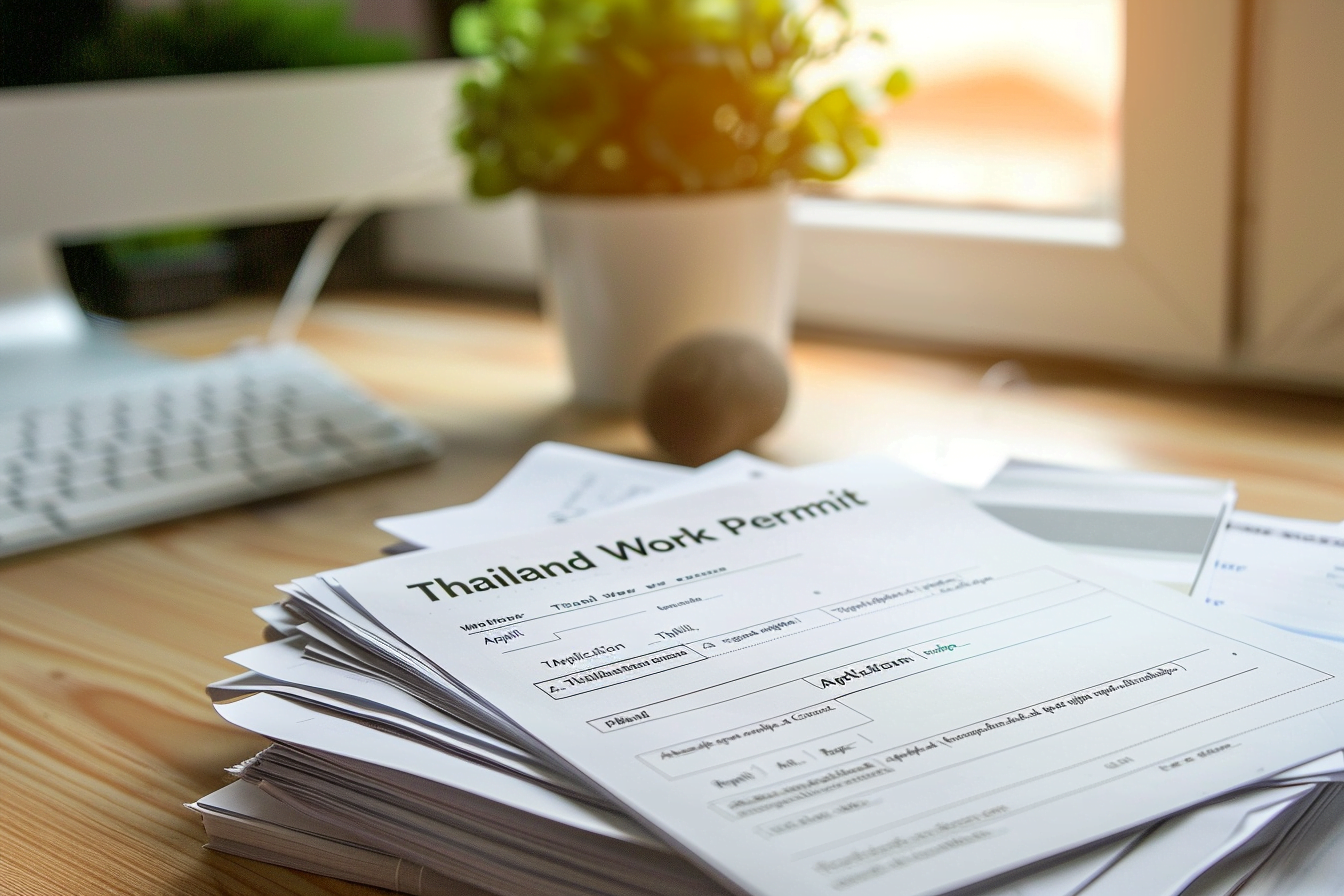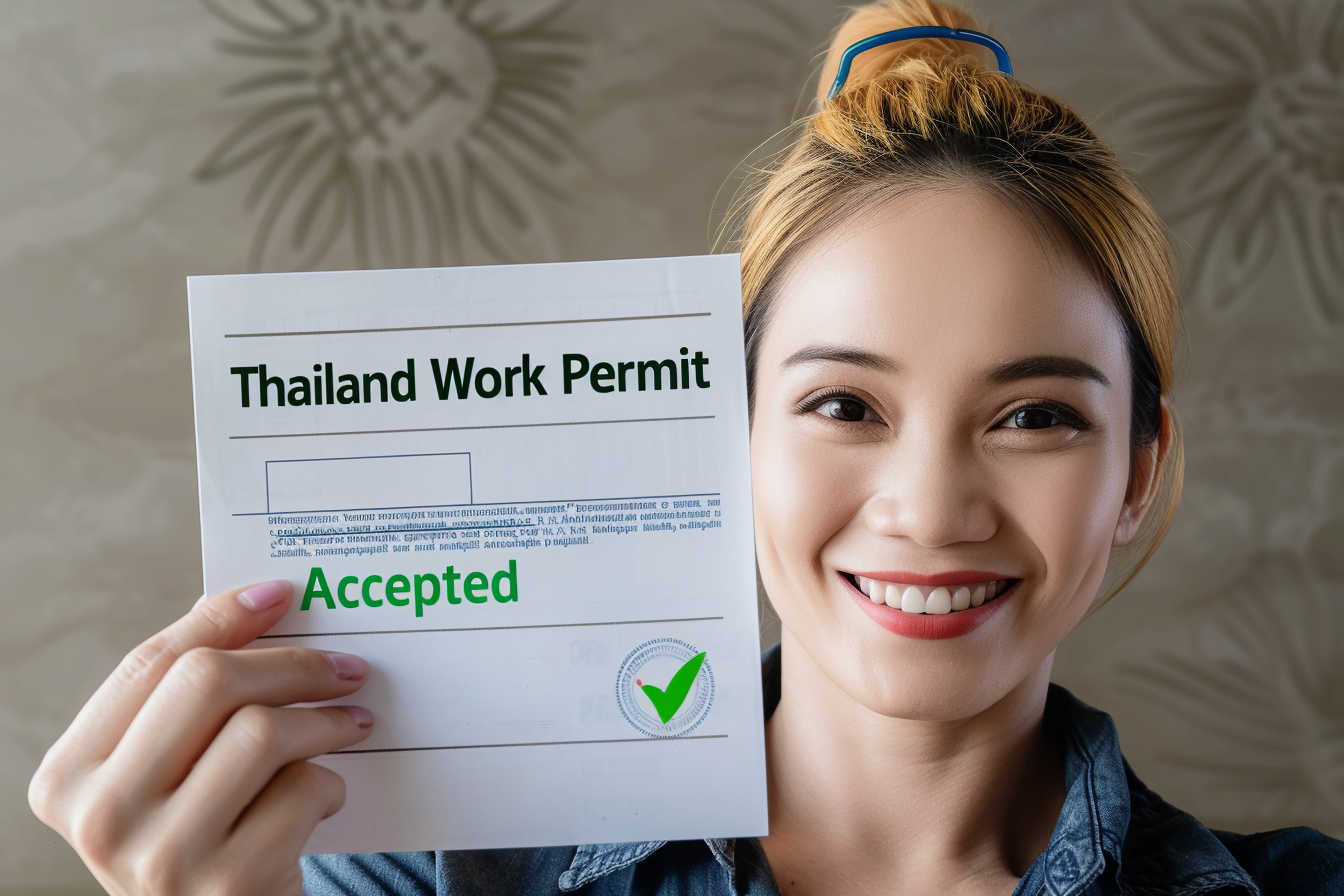Navigate Thailand’s work permit quota for foreign employees with our comprehensive guide to securing your place in the Thai job market.
Over 3 million foreign workers contribute to Thailand’s vibrant economy, yet not everyone is privy to the stringent legal framework governing the Thailand work permit quota. For those dreaming of white sandy beaches and bustling city life as their office backdrop, the gateway begins with a crucial document – the work permit for foreigners in Thailand. This permit is more than a mere administrative formality; it’s the linchpin of legal employment for expatriates in the Land of Smiles.
Navigating the intricate legalities to obtain a foreign employee work permit Thailand requires an understanding of the tightrope walked by businesses and expats alike. Companies must balance their economic contributions and tax liabilities with the demand for international expertise, all the while ensuring opportunities for local employment are not overshadowed.
Key Takeaways
- Understanding the Thailand work permit quota is essential for businesses and foreign nationals.
- A Non-Immigrant Visa is the foundation for securing a work permit in Thailand.
- Work permits are tied to specific conditions, including company capital, tax payments, and employment of Thai nationals.
- Compliance with the work permit for foreigners in Thailand is not optional but legally mandated.
- Certain categories of workers may have different requirements or exemptions, shedding light on the multifaceted nature of the work permit system.
Understanding the Thailand Work Permit System
For foreign professionals aiming to work in Thailand, navigating the complexities of the local work permit system is vital for ensuring compliance with the country’s legal framework. The process is governed by a set of regulations designed to manage the employment of expatriates effectively. This section delves into the intricacies of Thailand work permit requirements for foreign employees, the conditions for eligibility, and the essential role of the Non-Immigrant Visa.
The Necessity of a Work Permit for Legal Employment
In Thailand, employment of any kind, from executive positions to skill-based roles, is contingent upon holding a valid work permit. This legal document serves as proof of an individual’s right to work in the country and is a cornerstone of work permit regulations in Thailand. Foreign nationals discovered working without one can face severe penalties, including fines and deportation.
Key Conditions for Work Permit Eligibility
Eligibility for obtaining a work permit in Thailand is dependent on a variety of conditions. These include but are not limited to, a company’s financial stability, demonstrated through minimum registered capital, and its economic contribution, shown through income tax payments. Another critical factor considered in the work permit quota in Thailand is the proportion of Thai nationals employed in comparison to foreign staff. Adherence to these conditions is scrutinized to ensure that opportunities for the local workforce are not unduly restricted by the employment of foreign nationals.
| Condition | Requirement | Detail |
|---|---|---|
| Company Capital | Minimum Threshold | Must demonstrate a level of registered capital adequacy |
| Income Tax Contribution | Documentation | Proof of income tax payments by the employer for economic contribution |
| Employee Ratio | Thai to Foreigner | Prescribed number of Thai nationals employed per foreign employee |
The Role of the Non-Immigrant Visa
The Non-Immigrant Visa forms the legal foundation upon which a work permit can be issued. This type of visa is specifically tailored for those looking to engage in business, or employment within Thailand’s borders. Without this visa, one’s application for a work permit cannot proceed, highlighting the visa’s critical importance in the application process.
Ultimately, the path to securing a work permit in Thailand is one of due diligence and strict adherence to the country’s employment guidelines for foreigners. By meeting the essential requirements and navigating the legalities with precision, foreign employees can contribute to the vibrant tapestry of Thailand’s workforce in a meaningful way.
The Criteria for Work Permit Quota for Foreign Employees in Thailand
The work permit quota for foreign employees in Thailand is subject to a web of criteria which aim to balance the economic development goals of the country while managing the influx of foreign labor. Companies based in Thailand looking to hire expatriates must successfully navigate these rules to maintain compliance and ensure their workforce is legally permitted to operate within the country. Below is an understanding of the main criteria impacting the quota allocation for a foreign employee work permit in Thailand:
- The employer’s paid-up capital investment is scrutinized, with higher capital potentially allowing for greater foreign workforce inclusion.
- The amount of taxes paid to the Thai Revenue Department by the company is also a determining factor.
- Businesses known for their export prowess are rewarded with favorable permits, based on the foreign currency brought into Thailand through their activities.
- The ratio of Thai to foreign employees within a firm must meet certain thresholds to justify hiring from abroad.
Personal income tax contributions by the expatriate also play a crucial role in securing work permit eligibility, with those contributing more to the economy often finding the process more accessible. However, certain exceptions do apply, which allow for considerations outside these standard parameters:
- Contribution to technological advancements within Thailand.
- Employment in sectors experiencing local labor shortages.
- Capacity to significantly boost tourism.
Companies must ensure their proportions of domestic to international staff meet the legal mandates to maintain their ability to employ from overseas. The following table outlines some of the key measures influencing the work permit quota:
| Criteria | Detail |
|---|---|
| Paid-up Capital | Minimum requirement based on industry and size |
| Tax Contribution | Annual contributions to the Revenue Department |
| Export Performance | Amount of foreign currency earned from exports |
| Employee Ratio | Required number of Thai employees per foreign worker |
The strategic evaluation of company profiles based on these regulatory measures ensures that the foreign employee work permit in Thailand aligns with the nation’s socio-economic objectives and encourages businesses to operate within a framework that benefits all.

Navigating Work Permit Regulations in Thailand
For individuals and companies striving to adhere to the Thailand work permit rules and regulations, understanding the financial and tax conditions, quotas, and considerations for technology transfer is crucial. Navigating this complex landscape is essential for ensuring compliance and acquiring a work permit for foreigners in Thailand.
Financial and Tax Conditions for Employers
Employers looking to obtain work permits for foreign staff must meet specific financial benchmarks. These include maintaining a minimum amount of paid-up registered capital. They are also required to fulfill certain tax obligations, which demonstrates their financial commitment to the Thai economy and supports their case for employing international talent.

Quotas Based on Thai-to-Foreigner Employee Ratios
A delicate balance is maintained between the employment of Thai nationals and foreigners. Authorities have established clear quotas that stipulate the number of Thai employees required for each foreign staff member. This quota system ensures the inclusion of local workforce while enabling companies to hire international experts when necessary.
Technology Transfer and Skill Development Considerations
The Thai government encourages roles that facilitate the transfer of new technologies and skills. Work permits are more readily available for those contributing to the upskilling of the Thai workforce and bringing specialized knowledge into the country, thereby contributing to Thailand’s development and competitive stance in global markets.
Work Permit Application Process for Foreigners in Thailand
The journey to obtaining a work permit in Thailand involves a thorough documentation process, compliance with legal requirements, and understanding the intricacies of the Thailand work permit quota. The applicant must ensure that all forms and certificates are in line with the stipulations that govern the issuance of a Thailand work permit.
Documents and Information Required
Commencing the work permit application entails gathering a myriad of documents. The essential paperwork includes:
- Employment agreement or contract
- Corporate documents of the employing company, such as the affidavit and financial statements
- Record of tax payments evidenced by tax forms
- Reports outlining the company’s business activities
- Personal identification such as copies of the applicant’s passport
- Educational and professional qualification certificates
All documents submitted must be endorsed with the official seals of the company and signed by authorized personnel, demonstrating the legitimacy of both the applicant and the employer.
Health Certificates and Background Checks
Integral to the work permit application is the assemblage of health records ensuring the applicant’s fitness to work:
- A health certificate from a licensed Thai doctor that includes specific medical tests, for instance, a test for syphilis.
- Police clearance records from the applicant’s home country and any other nation resided in during the past decade, ensuring that no criminal background hampers the application.
These health and legal clearances are necessary to affirm the applicant poses no threat to public order or safety—a critical consideration in the work permit application process.
Adhering to these steps is crucial for a successful work permit application for foreign employees in Thailand. Understanding the regulatory framework surrounding the Thailand work permit quota is equally important to ensure a smooth transition into the Thai workforce.
Specific Quotas for Various Business Operations
Within Thailand’s landscape of commerce and trade, the work permit quota for foreign employees in Thailand is a critical provision that benefits both the economic sphere and the labor market. These quotas vary according to the industry needs and are largely influenced by operational scales, particularly in the domains of investment, revenue, and export activities. For companies aiming to flourish in Thailand’s dynamic market, understanding these quota regulations is indispensable for strategic planning.

Investment, Revenue, and Export Performance Thresholds
The Thai government encourages foreign investment and businesses with substantial economic contribution are permitted to employ foreign professionals to a greater extent. These businesses must exceed specific investment and revenue benchmarks, alongside proving a robust export performance, to qualify for a larger foreign employee work permit quota. It is a strategic effort to ensure that foreign employment feeds directly into the growth and internationalization of the Thai economy.
Employment of Highly-Skilled Foreign Workers
There is a distinct recognition of the demand for highly-skilled workers, especially in fields where Thai professionals may be underrepresented. Industries requiring specialized knowledge or expertise from overseas can leverage this system to address their workforce needs. This not only facilitates the crucial transfer of skills and technology but strategically bolsters the capabilities of the local workforce, ensuring long-term economic competitiveness and innovation.
Thailand Work Permit Rules and Regulations
Navigating the complexities of Thailand work permit rules and regulations requires a thorough understanding and stringent adherence to specific protocols. Foreign employees in Thailand must not only secure the initial work permit but also stay vigilant regarding its validity and any ensuing procedural obligations. This ensures both the employee and employer are operating within the bounds of Thai law, circumventing potential legal implications.
Renewal and Modification of Work Permits
The process for renewal and modification of work permits is straightforward yet imperative for compliance. Foreign staff must recognize the importance of renewing their permits in a timely fashion and notify authorities of any changes affecting employment, such as job role transitions or adjustments in company location. Adhering to these rules preserves the legality of an expatriate’s employment status in Thailand, and safeguards against interruptions in their professional endeavors.
Penalties for Non-compliance with Work Permit Laws
The ramifications of not complying with work permit requirements for foreign employees in Thailand can be severe. Expatriates and organizations alike must be fully aware of the consequences, which range from financial penalties to more dire outcomes such as incarceration. Ensuring that all information is current with the Thai immigration department is essential to avoid such unwelcome consequences. Moreover, understanding labor regulations related to severance ensures that both parties – the employer and the foreign employee – are prepared in cases of employment conclusion devoid of justifiable cause.
FAQ
What is a Thailand Work Permit Quota?
The Thailand work permit quota is a system that determines the number of foreign staff a company can legally employ in Thailand. This quota is based on several factors, including the company’s capital, the amount of tax paid, and the ratio of Thai to foreign employees.
Why is a Work Permit necessary for employment in Thailand?
A Work Permit is necessary as it’s a legal requirement for any foreign national who wishes to work in Thailand. It specifies the conditions under which a foreigner may work, including the company, position, and nature of the work. Working in Thailand without a permit is illegal and can result in penalties.
What are the key conditions for Work Permit eligibility in Thailand?
Key conditions include having a non-immigrant visa, working for a company that meets specific financial criteria, filling a position that doesn’t violate the Alien Employment Act, and for the employee to pay personal income tax in Thailand.
What is the role of the Non-Immigrant Visa in the Work Permit process?
The Non-Immigrant Visa is a prerequisite for a work permit in Thailand. It allows individuals to stay in Thailand for the purpose of work and is needed before one can apply for a work permit or start the application process.
What financial and tax conditions must employers meet to obtain work permits for foreign staff?
Employers must demonstrate that they have a certain level of paid-up registered capital and that they have paid a minimum amount of taxes to qualify for hiring foreign employees. They must also comply with the Thai-to-foreigner employee ratio requirements.
How are quotas based on Thai-to-foreigner employee ratios determined?
In general, a company can employ one foreign worker for every four Thai employees. However, this ratio may vary depending on the nature of the business and other conditions met by the company, such as export performance and revenue.
What considerations are there for technology transfer and skill development?
The Thai government provides special consideration for foreign workers who transfer new technology or skills to Thailand that are not readily available in the Thai labor market. This ensures that hiring foreign workers contributes to the upskilling of Thai nationals.
What documents and information are required when applying for a work permit in Thailand?
Applicants must submit several documents, such as a valid passport, non-immigrant visa, health certificate, recent photograph, educational certificates, and evidence of employment, plus company documentation such as financial statements and tax filings.
What do health certificates and background checks entail?
Health certificates for a work permit must verify that the applicant does not have any prohibited diseases as specified by Thai law. Background checks involve assessing the applicant’s criminal record within Thailand and their home country.
What are the specific quotas for various business operations related to work permits?
Quotas differ based on business operations such as investment amounts, export performance, and revenue generation within Thailand. Companies demonstrating higher contributions to the Thai economy may be allowed a larger quota of foreign workers.
Who is eligible for the employment of highly-skilled foreign workers?
Employment sectors that require highly-skilled workers, with skills not widely available in Thailand, may be given special allotments. These sectors include those involved in advanced technology, innovation, or in positions critical to the Thai economy.
How often do I have to renew my work permit in Thailand, and what are the consequences if I don’t?
Work permits in Thailand typically have to be renewed annually. Not renewing a work permit or failing to comply with other regulations can result in fines, imprisonment, or deportation.
What are the penalties for non-compliance with work permit laws in Thailand?
Penalties include fines, imprisonment, or possibly both. Employers can also face sanctions for employing foreign staff without a valid work permit. It is crucial for both employees and employers to comply strictly with all work permit regulations.






Leave a reply